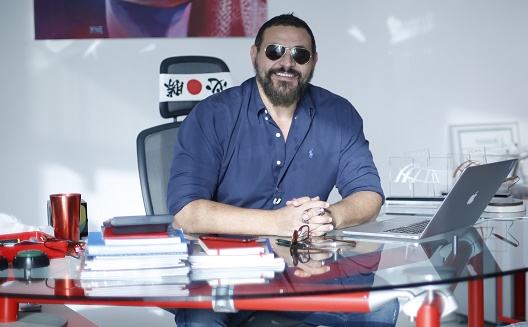Uturn's edgy Youtube hits get $10M investment


In November 2015, Uturn Entertainment landed a $10 million investment from Beirut-based VC Leap Ventures, a logical step on a journey that's taken them from being the first production house to create professional online content in Saudi Arabia to major regional media player.
In less than six years Uturn, founded in 2010 and based in Jeddah, increased its production from two shows, Eysh Elly (What is The) and Ala Al Tayer (On the Fly), to 15 shows and a total of 45 ‘aggregated assists’ - where Uturn would help to finance or produce a show, without actually owning the process.
Kaswara Al-Khatib, one of the original founders and owner since 2013, was the mastermind who turned Uturn from a production house into a multi-platform network with three million non-paying social media subscribers.
Since its launch, Uturn videos passed 1.85 billion views and an average of 100 million a month. The evolution of the business is also an example of the changing ways people and companies are using online media.
Wamda talked to Al-Khatib to discuss his vision for developing Uturn from a production house to a multiplatform network and his future plans for the company’s growth.

Wamda: What was the gap you wanted to fill in the market?
Kaswara Al-Khatib: The bigger picture was to create local content produced for youth.
Most of the content consumed by Saudi youth was from Egypt and other Gulf countries. With Uturn, we wanted to bring Saudi to the world.
We wanted to show what is happening in [the real] Saudi. We tried to reflect what is really happening in the normal Saudi street with its daily realities and concerns.
The second thing was becoming part of the digital revolution.
At the time, Saudi had the number one per-capita consumption of YouTube... and the Saudi content they were consuming was still amateur, unprofessional and unregulated.
We wanted to create professional content with a logo, an identity, a host, a studio and programmes with specific dates. We wanted the consumer to wait for the content and not just access it when bored online.
Wamda: When you produced those pilots, did you upload them on a website or through a Youtube channel?
Al-Khatib: Originally the idea was to be like Netflix where we would have our own website.
As an idea it sounded good but [when] we started looking into implementing it [we found] it would have been so expensive and we were not sure that people would visit this internet platform.
Through Youtube we already had a platform, so we decided to broadcast our content [there]. By early 2011, we became online partners and later we became premium partners.
Around 2012, we met with representatives from Yahoo and we started broadcasting our content through Yahoo as well.
Facebook approached us later on so we started putting our content on Facebook. We used to put the link of the Youtube video on Facebook but now we upload the video directly.
Through these deals, we expanded from being a multichannel network (MCN) to a multiplatform network (MPN).
In 2013, we launched our own iOS and Android application through which users can watch Uturn content. We are currently working with Samsung to make the application available on Samsung smart-televisions.
We are also working with mobile telecommunication company Zain, experimenting to have video on demand at a small scale. We will start in 2016 to see if we can monetize the content or if we should just maintain a premium model, where we offer [some] free content on a free platform.
Wamda: When do you expect the television applications to be ready?
Al-Khatib: We expect them to be ready in April.
Wamda: What about the level of censorship applied to your content? Would we see a difference between the on-demand videos and the television applications?
Al-Khatib: Our philosophy is to create content that is halal with harmony and honesty (the three Hs).
We do not want to be a company that creates controversial content or touches upon religion, politics or sexuality.
Those are the three taboos we do not approach. Our content is more social and we do not to stir public opinion or oppose norms or governments.
Wamda: What is your source of revenue?
Al-Khatib: Around 75 percent of [revenue is generated] using advertising, mainly through product placement, brand integration, pre-rolls and branded content.
A brand would sponsor an episode or a whole show. Nescafe, P&G, Unilever, 7up all sponsored our shows because they wanted to reach our target audience. The remaining 25 percent or less comes from YouTube.
Wamda: Do you expect your revenue to increase in the coming years?
Al-Khatib: There is general skepticism in the market because the first thing businesses cut is advertising.
However, because we are at the lower end of advertising, we are not that expensive; they might cut spending on television advertising and use some of that money to go online.
I expect, as we tap into new genres, that [revenues] will grow by 30 to 40 percent in 2016.
Wamda: Do you have any expansion plans outside Saudi Arabia?
Al-Khatib: Our target is mass localization. We want to target the mass but with local content.
Egypt is definitely on the map but we are putting [in place] a proper plan to hit the ground running.
We help aggregate shows in Kuwait, Bahrain and the UAE. We are also working on establishing an office in the UAE and it should be ready in two to three months.


